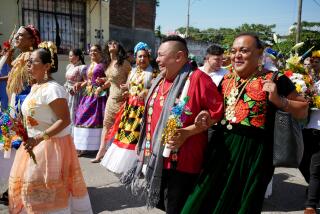Latin America ahead of U.S. on same-sex marriage
- Share via
As California and the United States struggle with the issue of same-sex marriage at the polls and in courtrooms, Latin America is moving more broadly toward acceptance of this basic human right. Last month, Argentina became the first nation in the region to legalize such marriages, granting wedded gay and lesbian couples the same legal rights, responsibilities and protections as heterosexuals. Following suit, senators from the opposition Socialist Party in Chile introduced a bill proposing to remove the “man and woman” clause from the marriage law there. And Mexico’s Supreme Court, which had upheld a law enacted in March permitting same-sex marriages in Mexico City, issued a 9-2 decision this week that gay marriages performed in the capital — a federal district like Washington, D.C. — must be recognized by all 31 states in the republic.
This is a wrenching issue for traditionally conservative and deeply religious countries, influenced by Roman Catholic and Protestant evangelical churches opposed to gay unions. Church leaders have taken strong public stands against gay marriage in Argentina and Mexico. But throughout Latin America, marriage is a civil institution performed by the state. The recognition that religion and civil law have different roles to perform in marriage is often painfully absent in the debate in this country; Latin American nations have hewed to that distinction and are better off for it. The Mexican Supreme Court is not liberal so much as committed to the primacy of civil law.
Still, there is political opposition too. Conservative Chilean President Sebastian Pinera has pledged to expand the rights of same-sex couples seeking civil unions, but says he believes marriage should be between a man and a woman. Mexican President Felipe Calderon’s conservative National Action Party has close ties to the Catholic Church, and his government had challenged Mexico City’s gay marriage law on the grounds that it violated constitutional protections of the institution of the family and procreation.
The Mexican Supreme Court overruled the president. It determined that the Constitution does not define “family,” procreation is “not an essential element of marriage,” and same-sex marriage does not interfere with the rights of those who want to conceive. The court is to rule on another challenge to Mexico City’s law allowing same-sex couples to adopt children.
The legal battles are far from over in Mexico, however. Although the court said states must recognize the marriages performed in the capital, it did not require the states to reform their laws to allow same-sex marriages. It also left the door open for states to legislate on divorce, pensions, inheritances and other issues involving same-sex couples. Some undoubtedly will enact restrictive laws that will end up back in the courts. But that is part of the long march of progress. In the meantime, Latin America has made great strides toward ending discrimination and granting equal rights to gays and lesbians.
More to Read
Sign up for Essential California
The most important California stories and recommendations in your inbox every morning.
You may occasionally receive promotional content from the Los Angeles Times.













